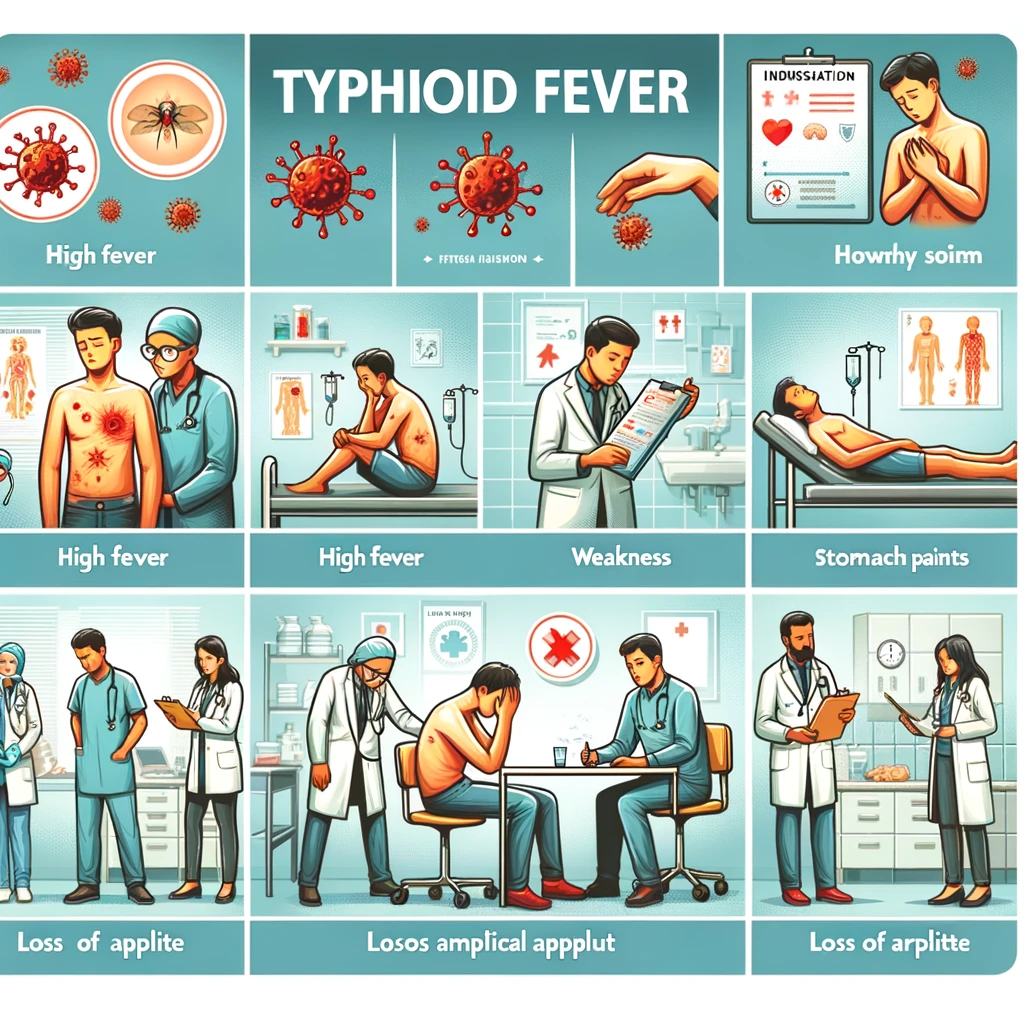Typhoid fever, caused by the bacterium Salmonella Typhi, presents with symptoms such as high fever, abdominal pain, and weakness, emphasizing the importance of early diagnosis and treatment.

What is Typhoid?
The bacterium Salmonella typhi is the virus that causes typhoid fever, which is a bacterial illness. This disease is typically spread through the consumption of contaminated food and drink. Understanding the basics of Typhoid is crucial for recognizing its symptoms and seeking timely medical intervention.
Symptoms of Typhoid:
The symptoms of Typhoid can vary in severity, and some individuals may carry the bacteria without showing noticeable symptoms. Common symptoms of typhoid fever include:
Fever: A sustained high fever is a hallmark of typhoid fever. The temperature can rise gradually, reaching as high as 104-105 °F (40-41°C).
Headache: Intense headaches are common and can be persistent.
Abdominal Pain: One may endure abdominal discomfort or agony, particularly near the liver and spleen.
Weakness and Fatigue: Individuals with typhoid fever often experience extreme weakness and fatigue.
Loss of Appetite: Anorexia and consequent weight loss might ensue.
Rose-coloured spots: A distinctive rash of small, flat, rose-coloured spots may appear on the body's trunk.
Diarrhoea or constipation: Changes in bowel habits are common, and individuals may experience diarrhoea or constipation.
Nausea and Vomiting: Feeling nauseous and vomiting may occur, contributing to dehydration.
Cough: A persistent cough may develop.
Joint pain and muscle aches: Some people with typhoid fever experience joint pain and muscle aches.
Typhoid Causes and Modes of Transmission:
Contaminated food and water: The most common transmission mode is consuming food or water contaminated with the faeces of an infected person. This contamination can occur anywhere in the food chain, from production to consumption. Poor sanitation and inadequate water treatment contribute to the spread of the bacteria.
Poor Hygiene: Inadequate hygiene practices, such as improper handwashing after using the toilet, can contribute to the spread of Typhoid. Contaminated hands can transfer the bacteria to food, water, or other surfaces.
Carrier State: Some individuals may become carriers of the bacteria without showing disease symptoms. These carriers can continue to shed the bacteria in their faeces for an extended period, potentially spreading the infection to others.
Close contact: Direct contact with an infected person or their possessions, such as clothing or utensils, is another potential transmission route.
Travel to Endemic Areas: Traveling to regions where typhoid fever is more common, especially in areas with poor sanitation and hygiene practices, increases the risk of exposure to the bacteria.
An Overview of the Diagnostic Process for Typhoid:
Clinical Evaluation:
Medical History: The healthcare provider will inquire about the patient's symptoms, recent travel history (especially to endemic areas), and possible exposure to contaminated food or water.
Physical Examination: A comprehensive medical evaluation will be carried out, looking for signs such as high fever, abdominal tenderness, and other symptoms associated with typhoid fever.
Laboratory Tests:
Blood Culture: This is the most definitive diagnostic test for typhoid fever. A blood sample is cultured to detect the presence of the salmonella enterica serotype typhi bacteria. Blood cultures may need to be repeated since the bacteria might not always be present in the early stages of infection.
Stool Culture: A stool culture may sometimes be performed to identify the bacteria in the faces, especially in chronic carriers.
Other Tests:
Widal Test: The widely used method has some limitations and needs to be more reliable than blood culture. It measures the levels of antibodies against specific salmonella antigens in the blood. Interpreting Widal test results requires caution and is often used with other diagnostic methods.
Bone marrow culture: In some cases, especially when blood cultures are negative, but clinical suspicion remains high, a bone marrow culture may be performed.
Imaging Studies:
Imaging tests like x-rays or ultrasound: These may be done to check for complications like intestinal perforation or other abnormalities in severe cases.
Typhoid Treatment:
The severity of the disease is one consideration when deciding which antibiotics to use, local antibiotic resistance patterns and individual patient factors. Here are standard antibiotic options for treating typhoid fever:
Fluoroquinolones:
Ciprofloxacin: This antibiotic is often the first choice for treating uncomplicated cases of typhoid fever. However, resistance to fluoroquinolones has been reported in some regions, so local resistance patterns should be considered.
Third-generation Cephalosporins:
Ceftriaxone: In cases where resistance to fluoroquinolones is a concern or for severe cases, intravenous ceftriaxone may be preferred. It is effective against Salmonella Typhi and can be used in adults and children.
Azithromycin:
Azithromycin: This antibiotic is an alternative treatment option, especially for fluoroquinolone-resistant cases. Azithromycin is generally well-tolerated and suitable for pregnant women and children.
The duration of antibiotic treatment varies, but it typically ranges from 7 to 14 days. If you want to be sure the bacteria are completely gone and lessen the chances of a recurrence or the development of antibiotic resistance. In that case, it's crucial to finish the course as recommended.
Symptom management and preventing complications are common goals of supportive care, including antibiotic medication. This may include:
Fever-reducing medications: Acetaminophen (paracetamol) can be used to control fever.
Fluid replacement: In extreme circumstances, intravenous fluids may be required to treat dehydration.
It's crucial for individuals diagnosed with typhoid fever to follow their healthcare provider's instructions carefully, take the prescribed antibiotics as directed, and attend follow-up appointments to monitor progress.
Critical Preventive Measures for Typhoid:
Vaccination:
Typhoid vaccines: Vaccines are available to protect against typhoid fever. The two main types are:
Injectable Vi polysaccharide vaccine: This vaccine provides protection for up to 2 years and is suitable for individuals aged two years and older.
Live attenuated oral Ty21a vaccine: This vaccine, which is given orally, offers protection for a period of up to five years and is appropriate for individuals who are six years old or older.
Travelers who are going to endemic areas are strongly encouraged to get vaccinated, those who are at an elevated risk of exposure, as well as those who live in or travel to regions with inadequate sanitation and hygiene in those areas.
Good Hygiene Practices:
Handwashing: Handwashing using soap and water on a consistent and thorough basis, particularly after using the restroom and before handling food, can be an effective means of preventing the transmission of typhoid bacteria across the body.
Sanitation: Ensuring access to clean and safe sanitation facilities can reduce the risk of contamination of food and water sources.
Safe food and water practices:
Drink safe water: Consume only boiled water or water adequately treated with chlorine or iodine tablets.
Eat safe food: Avoid consuming raw or undercooked foods, particularly meat and seafood, to make sure you don't get infected with the typhoid bacteria.
Peel Fruits and Vegetables: When doubting the safety of fruits and vegetables, peel them or wash them thoroughly with clean water.
Travel Precautions:
Avoid Risky Foods and Drinks: When ingesting food and beverages from vendors on the street or from establishments that do not have acceptable sanitation, It is of the utmost need to exercise caution, especially in regions where sanitary provisions are inadequate.
Vaccination for Travelers: Consider getting vaccinated against typhoid fever before travelling to regions where the disease is prevalent, especially if the trip involves prolonged stays or exposure to unsanitary conditions.
Health Education and Awareness:
Promote awareness of typhoid fever and educate communities about the importance of good hygiene, safe food and water, and vaccination.
Encourage early detection and treatment of typhoid cases to prevent further transmission.
Getting vaccinated against typhoid fever is essential for a number of reasons, and it plays a vital part in avoiding the spread of this potentially severe and occasionally life-threatening disease. There are a number of important reasons that underline the need of getting vaccinated against typhoid:
Typhoid Disease Prevention:
Salmonella enterica serotype Typhi is the causative agent of typhoid fever, which is a condition caused by bacteria. Vaccination is an effective way to prevent the occurrence of the disease by providing immunity against the bacteria.
Reduced Severity of Illness:
Even if vaccinated individuals contract Typhoid, the severity of the illness is often reduced. Vaccination can help prevent severe complications and decrease the risk of hospitalization.
Public Health Protection:
Typhoid vaccination contributes to overall public health by reducing the number of cases and limiting the spread of the bacteria within communities. This is particularly important in areas where Typhoid is endemic or regions with poor sanitation and hygiene.
Prevention of Antibiotic Resistance:
Over Reliance on antibiotics to treat Typhoid can contribute to the development of antibiotic-resistant strains of the bacteria. Vaccination helps reduce the need for antibiotics in prevention, contributing to the global effort to combat antibiotic resistance.
Traveller's Protection:
Individuals travelling to regions where Typhoid is prevalent are at an increased risk of exposure. Vaccination is recommended for travelers, especially those visiting areas with poor sanitation and hygiene conditions, to protect them from contracting Typhoid.
Community Immunity (Herd Immunity):
There is a correlation between the vaccination of a sizable percentage of the population and the development of community immunity. Individuals who may not be eligible for vaccination or who are unable to take the vaccine owing to medical reasons are protected in a roundabout way by this.
Cost-Effective Public Health Intervention:
Vaccination is often considered a cost-effective public health intervention, as it can prevent illness, reduce healthcare costs associated with treatment, and improve overall community well-being.
Global Health Initiatives:
There is a strong emphasis placed on vaccination as an essential component of global health programs by both international organizations and public health authorities. Vaccination campaigns in endemic regions aim to reduce the burden of Typhoid and improve health outcomes.
Frequently Asked Questions (FAQ)
Typhoid is a bacterial infection caused by Salmonella Typhi. It differs from other bacterial infections in its mode of transmission, symptoms, and potential complications. It is primarily transmitted by contaminated food and water, and it can result in severe symptoms that affect both the gastrointestinal tract and the body as a whole.
Common symptoms include fever, abdominal pain, headache, and gastrointestinal issues. Symptoms usually appear 6 to 30 days after exposure, making early recognition crucial for timely diagnosis and treatment.
Diagnosis involves clinical evaluation, blood tests, and sometimes stool cultures. If you experience symptoms like prolonged fever, you must consult a healthcare professional promptly for accurate diagnosis and appropriate treatment.
Antibiotics such as ciprofloxacin and azithromycin are commonly used for Typhoid treatment. The treatment course is typically 10-14 days, and it's crucial to complete the course to prevent antibiotic resistance.
Typhoid can be prevented through vaccination, good hygiene practices, and avoiding consuming contaminated food and water. Vaccination is essential for individuals travelling to areas where Typhoid is prevalent.
Yes, there are vaccines available for Typhoid. It is recommended for individuals travelling to regions with a high risk of Typhoid, as well as for those in certain occupations or with underlying health conditions. To select the most effective immunisation method, It is advised to consult with a trained medical professional.
Travel precautions include getting vaccinated, practising safe food and water hygiene, and being cautious about food consumption in high-risk areas. It's advisable to consult travel health experts for personalised advice based on the destination.
Typhoid Treatment
Typhoid treatment typically involves antibiotics to kill the Salmonella typhi bacteria. Rest, hydration, and a nutritious diet are also important for recovery. In severe cases, hospitalization may be necessary for intravenous fluids and close monitoring. Early detection and treatment are crucial to prevent complications and speed up recovery.




